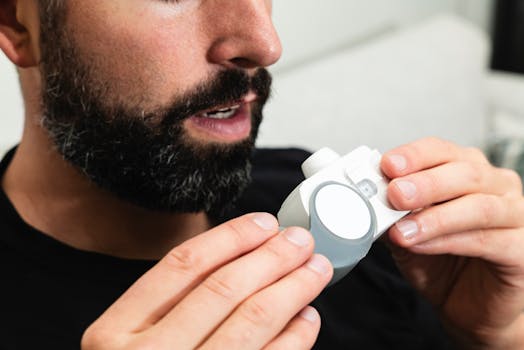
**
Cambridge Breakthrough: Smart Inhaler Tech Revolutionizes Asthma and COPD Treatment
The global fight against chronic respiratory diseases like asthma and chronic obstructive pulmonary disease (COPD) is witnessing a significant leap forward, thanks to a groundbreaking innovation from a Cambridge-based startup. This cutting-edge inhaler technology promises to personalize treatment, improve patient outcomes, and potentially reshape the future of respiratory healthcare. The technology, still in its final stages of development before market release, utilizes smart sensors and sophisticated algorithms to optimize medication delivery, offering hope to millions suffering from these debilitating conditions.
Revolutionizing Respiratory Care: The Smart Inhaler Advantage
Asthma and COPD affect millions worldwide, causing significant morbidity and mortality. Current treatments, while effective for many, often rely on a "one-size-fits-all" approach, leading to suboptimal outcomes for some patients. Incorrect dosage, inconsistent medication use, and difficulty managing symptoms are common challenges. The Cambridge startup's smart inhaler aims to directly address these issues.
Key Features of the Innovative Inhaler:
- Real-time Monitoring: Embedded sensors track medication usage, dosage, and inhalation technique. This data is crucial for tailoring treatment plans and ensuring patients are receiving the correct amount of medication.
- Personalized Dosage Adjustments: The smart inhaler leverages artificial intelligence (AI) to analyze the collected data and automatically adjust medication delivery based on individual patient needs and response. This personalized approach can significantly enhance treatment efficacy.
- Improved Adherence: By providing real-time feedback and personalized recommendations, the smart inhaler aims to encourage better medication adherence, a critical factor in managing chronic respiratory diseases. Poor adherence is a major contributor to exacerbations and hospitalizations.
- Remote Monitoring Capabilities: The inhaler connects wirelessly to a mobile app, allowing patients to track their progress and share data with their healthcare providers. This remote monitoring capability facilitates proactive management and enables early intervention when necessary.
- Data-Driven Insights: The collected data offers valuable insights into disease progression and treatment response, enabling doctors to make informed decisions and refine treatment strategies over time. This data-driven approach allows for more precise and effective management of respiratory illnesses.
Targeting Key Challenges in Respiratory Disease Management
The new inhaler technology directly tackles several key challenges in managing asthma and COPD:
- Suboptimal Medication Adherence: Many patients struggle to consistently take their medication as prescribed. This smart inhaler, with its tracking and feedback mechanisms, aims to improve adherence rates significantly. Improved adherence means fewer exacerbations and hospitalizations.
- Difficulty in Monitoring Symptoms: Accurately assessing symptom severity can be subjective. The technology's data-driven approach provides objective measures of medication usage and response, aiding in better symptom management.
- Inconsistent Inhalation Technique: Proper inhaler technique is crucial for effective medication delivery. The smart inhaler provides real-time feedback on inhalation technique, ensuring optimal drug delivery.
- Limited Access to Specialist Care: In many areas, access to specialized respiratory care is limited. Remote monitoring capabilities offered by the smart inhaler can bridge this gap and improve access to quality care.
Asthma Management and COPD Treatment: A New Era
This smart inhaler technology is poised to revolutionize both asthma management and COPD treatment. For asthma patients, the technology can help optimize controller medication use, minimize exacerbations, and reduce reliance on rescue inhalers. In COPD management, it can help ensure patients receive the right dose at the right time, leading to improved lung function and quality of life. Furthermore, the technology could assist in early detection of exacerbations, enabling timely intervention and preventing hospitalizations.
The Potential for Wider Applications
The technology developed by the Cambridge startup has potential applications beyond asthma and COPD. It could be adapted for other respiratory conditions, such as cystic fibrosis and bronchiectasis. The underlying principles of personalized medication delivery and remote monitoring could also be valuable in managing other chronic diseases.
Future Outlook and Market Implications
The successful development and market launch of this smart inhaler technology have significant implications for the healthcare industry. It promises to improve patient outcomes, reduce healthcare costs, and redefine the way respiratory diseases are managed. The innovative approach of combining smart sensor technology with AI-powered personalization marks a significant step towards precision medicine in respiratory care. The company is anticipating FDA approval within the next 18 months and is already in discussions with major pharmaceutical companies for distribution and marketing partnerships.
Keywords:
- Smart inhaler
- Asthma treatment
- COPD treatment
- Respiratory disease
- AI in healthcare
- Personalized medicine
- Remote patient monitoring
- Digital health
- Cambridge startups
- Innovation in healthcare
- Medication adherence
- Lung function
- Breath-actuated inhaler
- Wireless inhaler
- Inhaler technology
- Chronic respiratory diseases
This innovation holds immense promise for revolutionizing respiratory care and improving the lives of millions affected by debilitating lung conditions. The future of respiratory health management is looking increasingly smart, personalized, and effective.


















